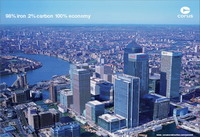US economy's foundation cracks and needs recession
The first significant trouble in the U.S. economy appeared when a government report last week showed employers had cut jobs for the first time in four years.

As the housing pain drags on and a painful credit crunch tests the country's economic resiliency, will the employment crack get worse? Will other fractures appear? And will they cause the economy to crumble into a recession?
Here are some pertinent questions and answers:
Q: What happened with housing?
A: After a heady five-year boom, the housing market went bust more than a year ago. Sales cooled and so did home prices. The housing slump - the worst in roughly 16 years - has been the biggest weight on the U.S. economy. Its fallout has hit some people and companies.
For instance, home builders stuck with bloated inventories of unsold homes have scaled back production and cut jobs. So have certain manufacturers, such as furniture makers.
Q: How have people been affected?
A: Weaker home prices have made it harder for people to treat their homes as piggy banks - extracting cash from them to support spending sprees.
Spending by individuals is a main shaper of overall economic activity. In the April-to-June quarter, the most recent period available, consumer spending grew at its weakest pace in 1 1/2 years.
During the same period, many businesses ramped up spending and investment. However, the credit crisis, which took a turn for the worse in August, threatens to chill spending and investment by both businesses and individuals.
Q: Why are home foreclosures and late payments rising?
A: The combination of higher interest rates and weaker home prices during the housing slump clobbered some homeowners, especially "subprime" borrowers. Foreclosures have climbed to record highs as more and more overstretched people find it impossible to make their mortgage payments.
Q: Who holds subprime mortgages and why have these borrowers been so hard hit?
A: Subprime borrowers tend to be those with blemished credit histories or lower incomes. Many are minorities.
Many subprime mortgages offered very low initial "teaser" interest rates that jumped to much higher rates over the life of the loan. Adding to borrowers' headaches: steep penalties for prepaying their home loans. Many borrowers could not afford to get out of their loans, refinance or even sell their homes.
Q: Was this the beginning of the credit crunch?
A: Yes. As foreclosures and late payments in the subprime market soared, lenders were forced out of business and hedge funds and other investors holding risky subprime securities took a financial hit.
Although the carnage has been the worst in the subprime market, troubles have spread to more creditworthy borrowers. The situation has caused stocks on Wall Street to careen wildly.
Q: What is the danger of a credit crisis?
A: Credit is the economy's life blood. Ifit becomes increasingly harder to obtain, it can crimp spending and investing by people and businesses. That would slow overall economic growth. In a worst-case scenario, the economy could slide into a recession. People depend on credit to finance big ticket items, such as cars and homes. Companies rely on it to finance expansions, new ventures and other activities that affect hiring.
Q: Does the credit crunch affect the outlook for housing?
A: Yes. Increasing restrictive credit conditions mean the housing market is likely to remain mired in its slump for a longer period of time - probably well into next year. That is a risk to the economic outlook.
This year the economy is expected to log its worst growth in five years - a 2 percent increase, according to forecasters at the National Association for Business Economics. Next year, forecasters expect the economy to grow by 2.8 percent, which would still be a subpar performance. If consumers and businesses pull back in a big way, though, economic activity could grind to a halt.
Q: What happened to jobs in August?
A: The government reported Friday that the economy lost 4,000 jobs in August, the first such decline in four years. Mostly healthy employment - up until last week's report - has acted as a shock absorber for the economy. Job and wage growth have helped to cushion the ill effects of the sour housing market on consumers.
If the employment climate continues to weaken in the months ahead, wage growth probably will slow, too. People could cut spending, dealing a major blow to the economy. Similarly, if businesses slice jobs and capital spending at the same time consumers pull back, the plug would be pulled on a six-year-old economic expansion.
Q: How do we know if we're in a recession?
A: By one rough rule of thumb, a recession occurs when there are two consecutive quarters when the economy shrinks. The size of the economy is measured by gross domestic product - the value of all goods and services produced within the United States.
The economy barely grew in the first quarter of this year, but rebounded in the second quarter. The rate in the current July-to-September period is expected to be smaller - but still positive.
The National Bureau of Economic Research, the recognized arbiters for dating recessions, uses a more complicated formula that takes into account such things as employment and income growth. The country's last recession started in March 2001 and ended in November 2001.
Q: What can the Federal Reserve do?
A: Last week's weak employment report put pressure on the Fed to lower a key interest rate now at 5.25 percent. Many economists believe the Fed will slice this rate by one-quarter or one-half percentage point on Sept. 18. If it does, the prime lending rate charged to millions of consumers and businesses also would drop. In time, this could stimulate business and consumer spending, bolstering overall economic activity.
Subscribe to Pravda.Ru Telegram channel, Facebook, RSS!





